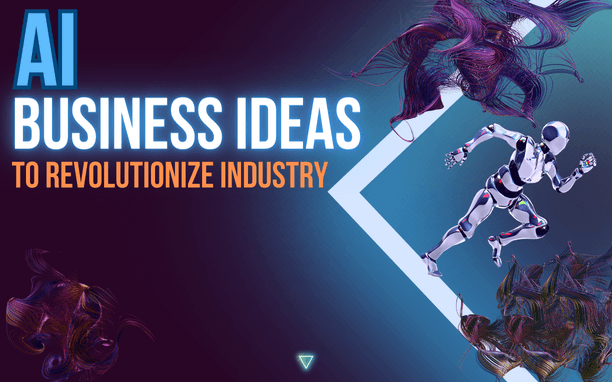AI Business Ideas to Revolutionize Your Industry is a comprehensive guide for entrepreneurs, innovators, and industry leaders who want to harness AI’s transformative power. AI presents unparalleled opportunities to streamline operations, boost productivity, and fuel business growth in today’s fast-paced technological landscape. This book explores diverse industries, offering actionable insights, case studies, and practical strategies to unlock AI’s full potential.
Introduction
In today’s fast-paced business environment, utilizing the power of artificial intelligence (AI) has become critical to maintaining competitiveness and driving innovation. This blog aims to explore various AI business ideas across industries, highlighting their significance and potential impact on reshaping traditional practices and processes.
The Power of AI in Business

AI isn’t just a buzzword; it’s an innovative game changer. Its ability to analyze large amounts of data, identify patterns, and accurately predict has transformed business operations. By leveraging AI business ideas, tools, and solutions, companies can streamline operations, enhance decision-making processes, and unlock new revenue streams.
AI, often called the cornerstone of the fourth industrial revolution, encompasses technologies that simulate human intelligence to perform tasks efficiently. Integrating AI into business operations offers many benefits, including enhanced decision-making, improved efficiency, and the ability to unlock valuable insights from data. However, it also comes with challenges, such as data privacy concerns and ethical considerations, which must be carefully addressed.
AI Business Ideas Across Industries
1. Retail Sector

Starting an AI-based retail business offers innovation, operational optimization, and enhanced customer experiences. It requires thorough market research, niche definition, AI business ideas having AI technology development, user-friendly platform, product catalogue curating, personalization, customer service, marketing strategy, and KPI monitoring.
a. Personalized Shopping Experiences
Artificial intelligence revolutionises consumer interactions and purchasing decisions by providing personalized product recommendations, virtual stylists, chatbots, virtual assistants, dynamic pricing, predictive analytics, augmented reality, virtual reality, customer segmentation, targeted marketing, and voice commerce.
b. Inventory Management Optimization

Managing inventory can be a time-consuming and complex task for businesses. AI business ideas inventory management optimizes business inventory levels by analyzing sales data and predicting future demand. This approach reduces waste, streamlines replenishment processes, and minimizes stockouts or overstock situations. AI also analyzes historical data and market trends, improving operational efficiency and profitability. This approach enhances customer satisfaction and competitiveness in the market.
c. Dynamic Pricing Strategies
Dynamic pricing strategies powered by AI analyze demand trends, track competitors and offer customized discounts. They enable real-time inventory management, location-based, event-based, and order pricing. Continuous learning improves these strategies and increases customer satisfaction in a competitive market.
2. Healthcare Industry

AI business ideas transform healthcare, improving diagnosis, treatment, and operations. It aids early disease detection in medical imaging, tailors personalized medicine, and speeds up drug discovery. AI offers real-time clinical support, remote patient monitoring, and operational optimization. It extracts insights with NLP, enhances engagement through virtual assistants, and predicts at-risk populations, cutting costs. Yet, ethical and regulatory concerns demand responsible AI use.
a. Predictive Analytics for Patient Care
AI-powered healthcare predictive analytics utilizes advanced algorithms and machine learning to anticipate health events, optimize resource allocation, and tailor treatments. This technology improves patient outcomes, reduces hospitalizations, and extends healthcare access to underserved populations.
b. Medical Image Analysis

Medical image analysis uses AI and machine learning to interpret X-rays, MRIs, CT scans, and ultrasound images. It aids in detecting abnormalities, diagnosing diseases, and tracking treatment responses. Applications include computer-aided diagnosis, tumour detection, organ segmentation, and image-guided interventions. Automating image analysis improves patient outcomes, reduces errors, and optimizes treatment.
c. Drug Discovery and Development
AI transforms drug discovery and development, analyzing biological data to identify candidates and predict efficacy. Virtual screening expedites lead discovery, while AI optimizes preclinical and clinical trials, offering real-time data insights. This accelerates innovation and reduces costs in bringing new medications to market.
3. Finance and Banking

AI revolutionizes finance and banking by improving efficiency, accuracy, and customer experience. It analyzes financial data, detects fraud, provides personalized customer support, automates investment advice, enhances customer engagement, and uses cybersecurity solutions to prevent threats.
a. Fraud Detection and Prevention

AI can analyze transaction data and historical patterns to identify potential fraud or suspicious activities.
In the global artificial intelligence market, businesses can detect real-time fraud, mitigate risks, and protect customer assets. Intelligent fraud detection and prevention enhance security and trust in financial services.
b. Algorithmic Trading
Algorithmic trading, or algo trading, swiftly executes trades using computer algorithms. These algorithms analyze market data to identify opportunities based on price and volume, offering benefits such as efficiency and reduced costs. With technology advancements, algo trading has become prevalent, aiming to capitalize on market opportunities.
c. Customer Service Automation

Customer service automation uses AI and chatbots to streamline support processes, provide real-time responses, and streamline ticketing and resolution. It enhances efficiency, scalability, and transparency, freeing human agents for complex tasks.
4. Marketing and Advertising

Marketing and advertising are vital for businesses aiming to promote products and attract customers. Key components include market research, advertising campaigns across various channels, digital marketing, content creation, brand management, social media engagement, SEO, email marketing, influencer collaboration, and analytics. They collectively drive brand awareness, customer engagement, and business growth.
a. Targeted Advertising Campaigns

Smart AI business ideas targeted advertising reaches specific audiences via demographic, psychographic, or behavioural attributes. It involves audience segmentation, data analysis, personalization, channel selection, ad placement, A/B testing, and performance monitoring. These strategies optimize marketing effectiveness and efficiency.
b. Sentiment Analysis for Market Research
Sentiment analysis in market research involves analyzing consumer opinions, attitudes, and emotions from text data. It enhances businesses’ competitive advantage and guides marketing strategies, product development, brand management, and customer engagement initiatives.
c. Content Generation and Optimization
Digital marketing strategies rely on content generation and optimization to attract and engage target audiences. AI business ideas include creating relevant content, conducting keyword research, optimizing for search engines, targeting specific audience segments, and monitoring performance metrics. Continuous analysis and refinement drive organic traffic and achieve marketing objectives.
5. Education and E-learning

AI business ideas and E-learning startups are revolutionizing the education sector by providing personalized services and preparing students for career opportunities. To launch an e-learning startup, identify your niche, define your value proposition, develop high-quality content, choose the right technology, build an online presence, determine monetization strategy, prioritize user experience, engage with your community, and continuously improve. Seek professional pitch deck design services for guidance.
a. Adaptive learning platforms
These platforms analyze student data, provide real-time feedback, adjust learning materials based on performance, and offer interactive features, gamification elements, and multimedia content to enhance learning. These AI-driven platforms optimize student outcomes and promote lifelong learning.
b. Virtual Tutors and Mentors

AI business ideas, including Virtual tutors and mentors, provide vital support for learning and growth across subjects, using technology to connect learners globally. Features like video calls enhance the learning experience while offering convenience and cost-effectiveness. It’s essential to ensure tutor credibility, but overall, they play a crucial role in personalized guidance in the digital age.
6. Ethical and Legal Considerations

Ethical and legal considerations are crucial for responsible decision-making in personal and professional spheres. They guide actions towards well-being, rights, fairness, and accountability. Prioritizing these values builds trust, fosters positive relationships, and contributes to a just society.
a. Compliance with Regulations and Standards

Compliance with AI regulations and standards is crucial for responsible development and deployment. It involves adhering to legal requirements and industry guidelines governing the use of AI, such as data protection laws, sector-specific regulations, and ethical frameworks. AI developers and organizations can mitigate risks, protect user rights, and build trust with stakeholders in the AI industry.
b. Data Privacy and Security

In our digital age, data privacy and security are paramount. Privacy gives individuals control over their data, while security measures build trust and prevent breaches. Encryption and audits maintain integrity, and complying with regulations like GDPR or CCPA is vital for ethical data management. Prioritizing data privacy and security is a legal and moral obligation to nurture trust in our interconnected society.
c. Bias and Fairness in AI Algorithms
AI algorithms face bias and fairness issues, with skewed data and algorithmic design leading to unfair outcomes. Addressing these requires careful data collection, algorithmic techniques, transparency, diverse development teams, and ethical guidelines to ensure AI contributes positively without perpetuating inequalities.
d. Transparency and Accountability
Transparency makes AI algorithms’ inner workings accessible, enabling stakeholders to comprehend how decisions are made. Accountability establishes clear responsibility for the outcomes produced by AI systems, holding developers and operators liable for their actions. By upholding transparency and accountability, the AI industry can promote trust, mitigate risks, and foster ethical deployment of AI technologies.
7. Implementing AI Business Ideas

When implementing AI business ideas, it’s crucial to consider factors such as data quality, ethics, privacy, and regulatory compliance. Additionally, invest in ongoing research and development to stay ahead of technological advancements and remain competitive. Collaborating with domain experts and leveraging AI responsibly can lead to successful implementation and long-term business growth.
- Identifying business needs and goals
- Selecting appropriate AI technologies and tools
- Data acquisition and preparation
- Building and training AI models
- Testing and validation
- Deployment and integration into existing systems
- Continuous monitoring and improvement
Case Studies
Real-world Examples of Successful AI Business Ideas Implementations in Various Industries
- IBM’s Watson for Oncology aids oncologists in cancer diagnosis and treatment.
- JPMorgan Chase uses AI to detect and prevent fraud.
- Amazon’s recommendation engine utilizes AI to analyze customer behaviour and purchase history, generating personalized product recommendations.
- Siemens implements AI-powered predictive maintenance to optimize equipment performance and minimize downtime.
- Waymo’s autonomous vehicles use AI algorithms to navigate traffic and make real-time driving decisions.
- Salesforce’s Einstein AI enhances customer service by providing personalized recommendations and automating routine tasks.
These case studies demonstrate AI’s potential to drive innovation, improve efficiency, and deliver value to businesses and society.
Future Trends and Opportunities

Key trends and opportunities mark the future of AI. AI business ideas will expand, boosting efficiency and cutting costs across industries. Integration with edge computing drives this growth. Ethical concerns grow as AI becomes more widespread. Personalized AI experiences enhance customer engagement. AI’s impact on healthcare, life sciences, and environmental challenges is transformative. Interest in AI-powered cybersecurity solutions rises for enhanced threat detection.
Emerging AI Technologies and their Potential Impact
Artificial intelligence technologies such as generative adversarial networks (GAN), reinforcement learning, explanatory artificial intelligence (XAI), quantum machine learning and federated learning are transforming industries and areas of society. These advances and initiatives, such as AI for Social Good and AI Business Ideas, aim to create positive social impact and promote sustainable innovation.
Conclusion
AI Business Ideas provide the roadmap for businesses seeking to exploit AI’s transformative power to Revolutionise. By adopting AI innovation, companies can simplify operations, increase productivity, and tap new growth opportunities in a rapidly competitive market. The possibilities of AI are limitless, and the future of business is ripe for revolution, thanks to the right strategy and mindset.
FAQ’S
Q. How can AI benefit small businesses?
AI offers many benefits to small businesses, including increased efficiency, cost savings, better customer service, and access to advanced analytics and statistics.
Q: How can AI business ideas ensure the ethical use of AI?
Businesses should prioritize transparency, fairness, and accountability in AI development and deployment, along with regular audits and oversight.
Q: What are some common challenges in implementing AI business ideas?
Common challenges include data quality and availability, talent shortages, and integration with existing systems.
Q: What role will AI play in the future of business?
AI is expected to continue transforming business processes, driving innovation, and enabling new revenue streams through automation, predictive analytics, and personalized experiences.
Q. What are the potential risks of the implementation of AI business ideas?
While AI offers many benefits, it has potential risks, such as privacy issues, algorithmic bias, and job change. Addressing these risks and adopting AI responsibly and ethically proactively is important.







